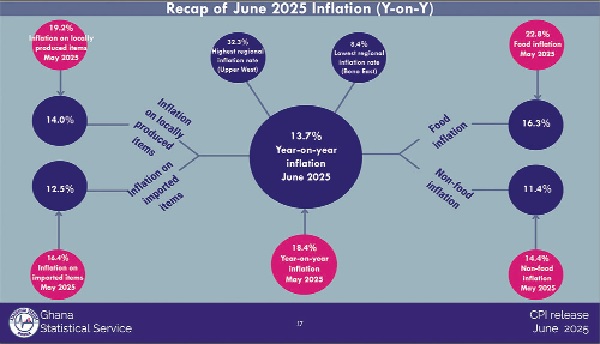
Food, non-food push June inflation down to 13.7% — Lowest since December 2021
IT cost consumers less to purchase goods and services in the month of June this year than it did in the months before, data released by the Ghana Statistical Service (GSS) has shown.
The Government Statistician, Dr Alhassan Iddrisu, said at a news conference last Wednesday that inflation for June fell to 13.7 per cent from the 18.4 per cent recorded in May.
The June rate is now the lowest annual inflation rate since December 2021 and the sixth straight decline in inflation this year.
Dr Iddrisu said the development is expected to provide some breathing room for households, a more predictable environment for businesses, and for policymakers, a powerful signal that recent fiscal and monetary efforts may be taking hold.
The main drivers of the decline were a drop in food inflation, which fell from 22.8 per cent in May to 16.3 per cent in June, and non-food inflation, which dropped to 11.4 per cent from 14.4 per cent.
Housing, water, electricity, gas and other fuels recorded an inflation rate of 24.9 per cent – up from 21.6 per cent in May, making it one of the few divisions to register an increase.
Goods vs services inflation
Goods inflation continued to outpace that of services, as in June, inflation for goods declined to 15.2 per cent from 20.1 per cent in May, while services inflation fell to 9.3 per cent from 14.3 per cent.
Goods accounted for over 70 per cent of the overall inflation rate, reflecting persistent cost pressures in consumer items, particularly essentials such as food, rent and energy-related services.
Prices for both locally produced and imported goods showed a general slowdown, with locally produced items recording a year-on-year inflation rate of 14.0 per cent, down from 19.2 per cent the previous month.
Imported goods also saw a drop, from 16.4 per cent in May to 12.5 per cent in June.
Inflation disparities
On a regional level, disparities in inflation rates remain significant. The Upper West Region recorded the highest inflation at 32.3 per cent, more than double the national average, driven by surging food and utility costs.
Key contributors in the Upper West Region included housing and utilities, which saw a price increase of over 1,220 per cent and food, which remained elevated despite national decline.
In contrast, the Bono East Region registered the lowest inflation rate at 8.4 per cent.
The Greater Accra (12.2 per cent), Ashanti (15.2 per cent) and Eastern (12.2 per cent) regions were among the top contributors to national inflation due to their higher population weights in the CPI basket.